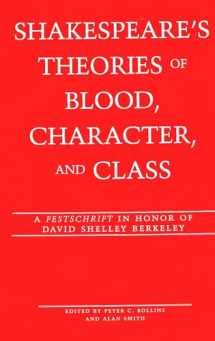
Shakespeare's Theories of Blood, Character, and Class: A "Festschrift in Honor of David Shelley Berkeley (Studies in Shakespeare) (v. 12)
ISBN-13:
9780820445182
ISBN-10:
0820445185
Edition:
0
Author:
ALAN SMITH, Peter C. Rollins
Publication date:
2001
Publisher:
Peter Lang Inc., International Academic Publishers
Format:
Hardcover
244 pages
FREE US shipping
Book details
ISBN-13:
9780820445182
ISBN-10:
0820445185
Edition:
0
Author:
ALAN SMITH, Peter C. Rollins
Publication date:
2001
Publisher:
Peter Lang Inc., International Academic Publishers
Format:
Hardcover
244 pages
Summary
Shakespeare's Theories of Blood, Character, and Class: A "Festschrift in Honor of David Shelley Berkeley (Studies in Shakespeare) (v. 12) (ISBN-13: 9780820445182 and ISBN-10: 0820445185), written by authors
ALAN SMITH, Peter C. Rollins, was published by Peter Lang Inc., International Academic Publishers in 2001.
With an overall rating of 4.2 stars, it's a notable title among other
books. You can easily purchase or rent Shakespeare's Theories of Blood, Character, and Class: A "Festschrift in Honor of David Shelley Berkeley (Studies in Shakespeare) (v. 12) (Hardcover) from BooksRun,
along with many other new and used
books
and textbooks.
And, if you're looking to sell your copy, our current buyback offer is $0.38.
Description
Shakespeare’s Theories of Blood, Character, and Class is a collection of essays that explores the works of Shakespeare by applying David Shelley Berkeley’s approach to them as literary manifestations of Elizabethan political, scientific, and social thought. Elizabethan scientific and medical principles held that, from conception, human beings were endowed with either hot or cold blood; as a result, the moral nature of individual human beings was considered as much a matter of physiology and eugenics (nature) as of moral instruction (nurture). With the best blood preserved among the aristocracy by selective breeding and by the consumption of the best food and drink and with the worst blood sustained among the lower classes by base parentage and by the enforced consumption of inferior sustenance, the Elizabethan citizenry – like Shakespeare’s characters – found itself rigidly stratified into social classes reflective of the widely varying quality of its blood. Shakespeare’s Theories of Blood, Character, and Class enhances the many current readings of Shakespeare on the basis of humors psychology by illuminating a neglected component of Elizabethan thought that is essential to a full understanding of Shakespeare and his times.


We would LOVE it if you could help us and other readers by reviewing the book
Book review

Congratulations! We have received your book review.
{user}
{createdAt}
by {truncated_author}


